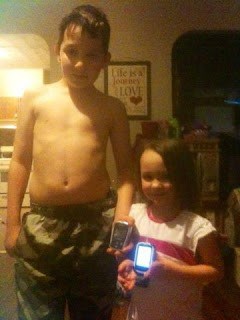
If you're a parent to a child with type 1 diabetes, you probably hear this all too often, along with the looks of pity and sympathy. All of which are well meant, and out of the kindness of their hearts. What I want to tell everyone is to NOT pity us, to NOT sympathize for us.
Maybe that seems rude to some, but I do not mean it in a rude way, because my kids are just that KIDS. Kids, who happen to live with a chronic illness, but 1st and foremost kids. Just like your kids are kids. I'm going to shed a little insight into this life, and what it's like. Be sure to read through to the end because while the beginning may seem like a gigantic wall you cannot climb over, the end will shed even more light into the actuality of what it's like when you've overcome the initial shock of diagnosis.
What's it like to be told your child has a chronic illness that there is no cure for?
Imagine having your heart physically ripped out of your chest, tossed to the ground, kicked around, stomped on, thrown up against the wall, and put back in place. This is pretty much the initial feeling (in the beginning).
What's it like to be told a second child has been diagnosed?
The initial heartbreak is there, just not as violent as the first. You already are accustomed to what the life entails. The heartbreak this time is more of a mourning for the death of your child's 'before' life. You realize how strong your children are and know they can handle this so you definitely can, because it's their disease and their body going through this, so you must be as equally as strong for them. To teach and guide them.

So what's it like, to parent a child with Type 1 diabetes?
Well initially, it's kind of like living in a dream, a dream you cannot wake up from. You remember the before, your normal, but now you have this new normal.
This new routine that involves pricking your child's tiny fingers 10+ times a day, sometimes holding them down to give them their shots when they aren't too excited about being poked with yet another needle. You walk around in a sort of daze, you are like a robot that is going through the motions, you know what to do, and you're getting it done, but it hasn't become reality JUST yet.
The nighttime is scary, you are told (in the beginning) be sure to test at 12 and 3am, to see how their numbers are so they can adjust insulin dosage if necessary.
You'll have lows that come out of nowhere, and at times you may have to force your sleeping child, who, refuses to wake up to drink a juice box, sacrificing their teeth to keep them alive, or rub cake icing on their gums when they won't get up and drink. You may even have to fight to hold them down or keep them from hitting you because they're sleeping and don't want to be bothered. Nighttime, (In the beginning) represents a time when you're not right by their side to keep an eye on them, and you must have faith that you've sent them to bed with a good number or that number at 3 am is good enough and will stay steady and not drop when you're not on watch (sleeping).
Now
Now, it's like parenting any of my other children. We are used to our new 'normal' yes we still poke their fingers and test 10+ times a day, yes we give injections or do pump site changes. But it's our life, our normal routine. Many times I have heard, "I couldn't do that to my child". I know it's well meant because what parent likes to hear their child scream and cry from a shot they are giving them because it's hurting them? But you really do not have a choice in the matter because guess what (TRUTH BOMB) without insulin they will die. It is literally life or death. When you look at the 'big picture' having them upset with me for a short while is nothing compared to losing them for a lifetime. They get used to it, it no longer hurts as bad. You may have your moments, but for the most part it's daily life and they got it down. Children are resilient, they bounce back and find happiness in every corner of the world. It's simply quite amazing. I wish a lot more adults were this way.
Nighttime is NOT as scary. Yes, there is still the fear that you may not catch a low. But what I have learned from this life is you cannot let fear live your life for you. If you succumb to it, well you will drive yourself mad. You have to feel comfortable with your skills as your child's new pancreas. You will learn how their body works with the insulin, how they react to corrections and treatments, and you will have a better understanding of what is a good 'number' for overnight.
Further reading:
You'll still check on them to make sure they are breathing when they sleep in, but I can bet you still check all your kids just not as often as you realize.
Your children will pick up on your fear, your worry, and that's not good for them either. They need to learn that this disease doesn't have soak up every single part of their life. They have to learn that they should be confident, and comfortable with their skills to care for their disease. This learning will come from you. Do you want to teach them to live a life of fear, or to live a life of greatness? The choice is yours.

I've chosen for my children to live a life of greatness and not to let fear dictate their lives. And the results of this, well you can see above. Our 4-year-old was thrilled to have diabetes. Yeah she still cries once in a while because of the shots, and gets irritated she needs 'tested' before eating. But if you ask her she's happy she has it. Fear had nothing to do with this mindset and attitude. I hope this article helped you understand how to treat a diabetes child better and how.
TheDiabetesCouncil Article | Reviewed by Dr. Christine Traxler MD on June 02, 2020





